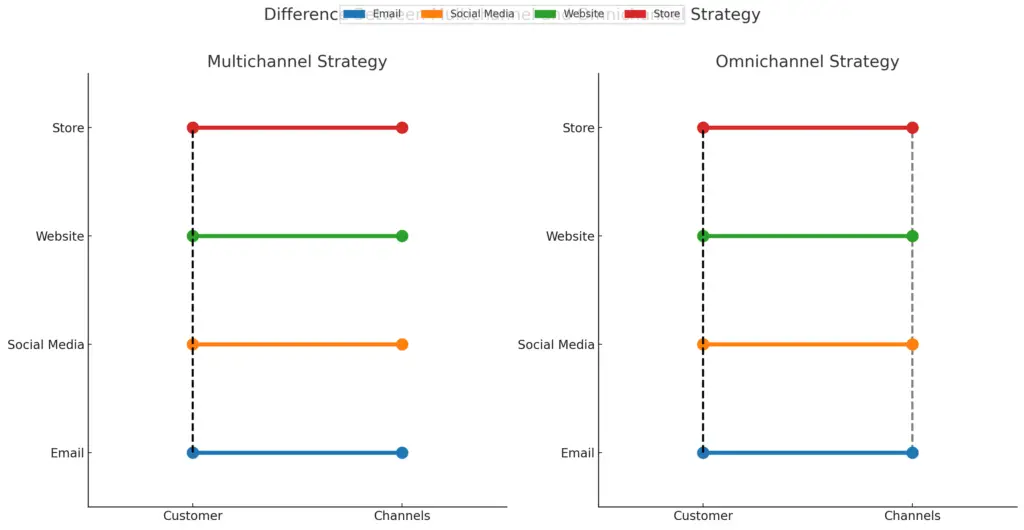This is like a double album, do people still make those anymore? I always struggle with saying albums now-a-days because everything is digital, but anyways this is too good to cram on post so this is part on of two. The second half will be posted next week!
Let’s talk about something that might seem confusing, but is super important for your business.
Omni-channel vs. multichannel strategy
These terms might sound like tech jargon, but trust me, by the end of this post, you’ll be able to drop them into conversation like you’re discussing if we are ever going to get a new Rih Rih album. She said we would…. eventually.
What’s the Deal with Multichannel Strategy?
Alright, let’s start with multichannel strategy. Imagine you’re running your business, and you’ve got all these different ways customers can reach you: your website, social media, email, your physical store, maybe even an app. Each of these channels operates on its own. Think of them like individual members of Destiny’s Child doing their solo careers. They’re all talented and fantastic, but they’re doing their own thing.
Got a customer issue on Instagram? You solve it there. Someone emails you? You handle it separately. Your physical store has a sale? Awesome, but your online shop isn’t necessarily in the loop. Each channel is doing its best, but there’s no crossover, no connection. It’s like having the pieces of a puzzle but not putting them together.
Enter Omni-channel Strategy
Now, let’s switch gears and talk about omnichannel strategy. This is where things get high-level and unforgettable. Like switching between Apple products. Imagine those same channels—website, social media, email, physical store, app—but now, they’re all working together in perfect harmony, like the ultimate concert tour where every song flows seamlessly into the next.
With an omnichannel strategy, your customer can start shopping on their phone, continue browsing on their laptop, and finish the purchase in your physical store without missing a beat. Their experience is smooth and connected at every step. It’s like listening to a Beyoncé album where every track is a hit, and they all tell a story together.
Key Differences

Integration
Multichannel means multiple, separate touchpoints. Omnichannel means integrated touchpoints.2.
Consistency
Omnichannel ensures a consistent and seamless customer experience across all channels. Multichannel can be hit or miss, with each channel potentially offering a different experience.
Customer-Centric
Omnichannel puts the customer at the center, creating a fluid journey. Multichannel focuses on having numerous touchpoints without necessarily considering the customer’s seamless journey.
Why Omnichannel in important to you CX
I get it—you might be feeling a bit overwhelmed. Learning new tech can feel intimidating. But, just like with anything, it’s all about taking it step by step. Here’s why embracing omnichannel can seriously upgrade your business:
1. Better Customer Insights: Omnichannel lets you track customer behavior across all touchpoints, giving you a holistic view of their preferences and needs. It’s like having the inside scoop on what your customers love, just like knowing every lyric to a Rihanna song.
2. Enhanced Customer Satisfaction: A seamless experience makes customers feel valued and understood, leading to higher satisfaction and loyalty. Think of it as giving your customers VIP treatment.
3. Increased Sales: When customers can effortlessly move from one channel to another, they’re more likely to complete purchases. Less friction, more action.
Making the Leap to Omnichannel
Switching from a multichannel to an omnichannel strategy isn’t like flipping a switch. It takes some planning, but you’ve got this! And we’ll cover that in our next post. Subscribe to get it!





